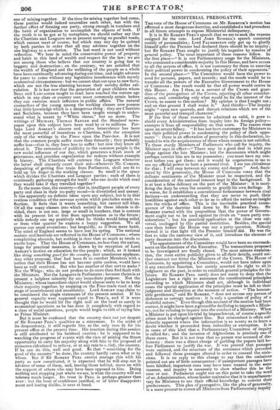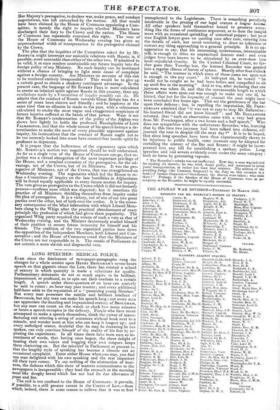MINISTERIAL PREROGATIVE.
THE vote of the House of Commons on Mr. ROEBUCK'S motion has affirmed a most dangerous doctrine, and established a bad precedent in all future attempts to expose Ministerial delinquency. It is in Sir ROBERT PEEL'S speech that we are to seek the reasons assigned for the vote. Lord Joan Ressenes speech consisted mainly of personalities ; Lord PALMERSTON only got up to glorify himself after the Premier had declared there should be no inquiry ; but Sir ROBERT PEEL sought to justify his negative by reasons of general policy. The most important of these reasons follow. In the first place—" It is not Parliamentary usage for the Ministers, who command a considerable majority in this House, and have access to all the secrets of office, it is not customary for them to exercise their political power in condemning the policy of their opponents." In the second place—" The Committee would have the power to send for persons, papers, and records ; and the result would be to transfer all the powers of the Executive Government to the House of Commons ; the result would be that all power would centre in this House. Am I then, as a servant of the Crown and guar- dian of the prerogatives of the Crown, rejecting all other consider. ations, and considering only what would be for the interest of the Crown, to assent to this motion ? My opinion is that I ought not ; and on that ground I shall resist it." And thirdly—The inquiry might " open new quarrels, and disturb relations which are of the most peaceful and tranquil character."
If the first of these reasons be admitted as valid, it goes to shield every Administration from inquiry into its foreign policy— exempts it from all responsibility on that score. The reason rests upon an arrant fallacy. "It has not been customary for Ministers to use their political power in condemning the policy of their oppo- nents " : there is an affectation of generosity in this declaration, in- tended to win the acquiescence of those whose reason is not satisfied. To those sturdy Members of Parliament who call for inquiry, the Minister says in effect—" There may be a good deal in what you allege against the late Minister; but the documents which might perhaps convict him are in my possession ; you must have my con- sent before you get them ; and it would be ungenerous in me to use my official power to hurt a personal rival. I am too chivalrous for that ; I will step between my enemy and danger." And, fasci- nated by this generosity, the House of Commons votes that the delicate sentiments of the Minister must be respected, and the consideration of the national interest kept in the background. It is at best a false delicacy on the part of the Minister : it is sacri- ficing the duty he owes the country to gratify his own feelings. It is worse, for it establishes a conventional forbearance between rival factions—an understanding that they are never to push their hostilities against each other so far as to afford the nation an insight into the tricks of office. This is the inevitable practical conse- quence of the doctrine laid down by Sir ROBERT PEEL. Sir ROBERT started with the proposition that the power of Govern- ment ought not to be used against its rivals on "mere party con- siderations " ; but his practical application at the close was uni- versal, unclogged by this partial restriction. Besides, the special case then before the House was not a party question. Nobody viewed it in that light till the Premier himself did. He was the first to take the narrower view of it, and introduce the element of party decorum into the discussion.
The appointment of the Committee would have been no encroach- ment on the functions of the Executive. The transactions proposed to be investigated are finally closed. The most minute examina- tion; the most entire publicity given to all their details, could nei- ther obstruct nor fetter the Ministers of the Crown. The House of Commons, by appointing a Committee, would not have taken upon it any executive function, but merely asserted its right to sit in judgment on the past, in order to establish general principles for the future. Sir ROBERT PEEL surely does not mean to deny that the Legislature has a right to announce the constitutional principles according to which Ministers shall act, although in individual cases the special application of the principles must be left to their judgment and discretion at the moment of action. " The honour- able gentleman," said Sir ROBERT, " does not accuse any person of dishonest or corrupt motives : it is only a question of policy of a doubtful nature." Even though this account of the motion had been correct, it might have been a groundfor declining to impeach a Minis- ter, not for refusing to inquire into the conduct of a Ministry. When a iinister is put upon his trial by impeachment, of course a specific crime must be charged against him. But misconduct is often suf- ficiently apparent where the information is so scanty as to leave a doubt whether it proceeded from imbecility or corruption. It is in cases of this kind that a Parliamentary Committee of inquiry is called for ; and the invasion of Afghanistan is precisely one of these cases. But it is not true that no person was accused of dis- honesty : there was a direct charge of garbling the papers laid be- fore Parliament to justify the war. It was proved that passages were omitted, and the structure of the sentences which preceded and followed those passages altered in order to conceal the omis- sions. It is no reply to this charge to say that the omissions pointed out are of little consequence : if unimportant passages have been falsified, important ones may have been treated in the same manner, and inquiry is necessary to show whether this be the case or not. Parliament ought not on this point to take the word of an Administration, whose leader maintains that it is unparliamen- tary for Ministers to use their official knowledge to convict their predecessors. Tbis plea of prerogative, like the plea of generosity, is a mere pretext to screen all Ministers from Parliamentary inquiry Her Majesty's prerogative, to declare war, make peace, and conduct negotiations, was left untouched by the motion. All that would have been claimed by the House of Commons appointing a Com- mittee, is merely the right to inquire whether Ministers have discharged their duty to the Crown and the nation. The House of Commons has repeatedly exercised this right. The vote of the House of Commons on Wednesday evening has given an unprecedented width of interpretation to the prerogative claimed by the Crown.
The plea that the inquiries of the Committee asked for by Mr. ROEBUCK might interrupt our amicable relations with Russia, is, if possible, more untenable than either of the other two. If admitted to be valid, it at once renders unattainable any future inquiry into the foreign policy of any Ministry. No such inquiry can be instituted without a chance of bringing to light some cause of complaint against a foreign country. Are Ministers on account of this risk to be rendered entirely irresponsible ? This would be to give up a certain good to obtain a shadowy contingent advantage. In the present case, the language of Sir ROBERT PEEL is more calculated to create an inimical spirit against Russia in this country, than any revelations made by a Committee of inquiry possibly can do. He admits that the conduct of Russia towards Great Britain has for a series of years been sincere and friendly ; and he implores at the same time that no allusion be made to the past, with a vehemence calculated to excite the most vague and exaggerated suspicions of former injuries suffered at the hands of that power. Were it not that Sir ROBERT'S condemnation of the policy of the Afghan war shows how lightly he holds the professed Russiaphobia of Lord PALMERSTON, and that the whole tenour of his speech betrays a de- termination to make the most of every plausible argument against inquiry, his insinuations that the conduct of Russia ought not to be too narrowly looked into must have created that hostile spirit he professes to deprecate.
It is proper that the hollowness of the arguments upon which Mr. ROEBUCK'S motion was negatived should be well understood. As far as a single vote of the House of Commons can go, that re- jection was a virtual abnegation of the most important privilege of the House, and a nominal extension of the prerogative, for the ad- vantage, not of the Crown, but of its Ministers. It was the pre- rogative of Ministers, not of the Crown, that was strengthened on 'Wednesday evening. The arguments which led the House to re- fuse.a Committee of inquiry on the late hostilities in Afghanistan will be found equally applicable to every future motion for inquiry. The vote gives no prerogative to the Crown which it did not formerly possess—confirms none which was disputed ; but it sanctions the practice of all Ministers shielding themselves from inquiry under the plea of prerogative. It is a victory, not of one of our two greal parties over the other, but of both over the nation. It is the neces- sary consequence of the blind infatuation with which Liberal Mem- bers clung to the Whigs after the practical abandonment of every principle the profession of which had given them popularity. The organized Whig party required the screen of such a vote as that of Wednesday evening, and the Minister dexterously availed himself of their position to secure future immunity for himself and his friends. The coalition of the two organized parties bore down the opposition of the independent Members, both Liberal and Con- servative ; and the House of Commons voted that the Ministers of the Crown are not responsible to it. The annals of Parliament do not contain a more slavish and disgraceful vote.



























 Previous page
Previous page